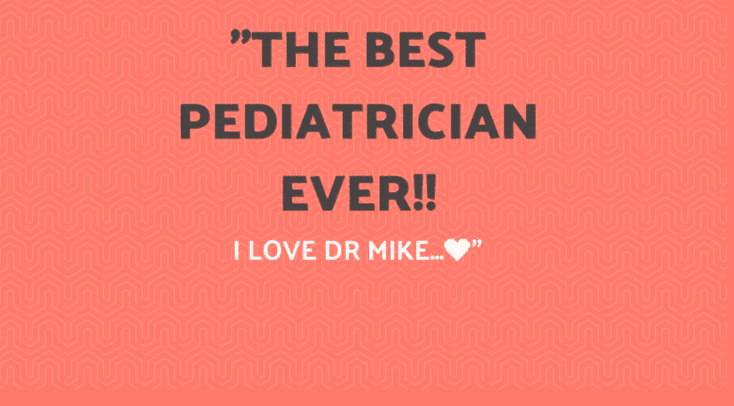As parents, ensuring your child’s physical and mental health is essential. However, navigating pediatric healthcare can be intimidating, with its complex medical terminology, insurance paperwork, and an array of healthcare specialists posing a challenge.
Being at the helm of pediatric healthcare can be unnerving for any parent. This article provides new and veteran parents with important information. It is hoped that this guide will help you become a confident advocate for your children’s health and well-being. We are writing as one of the top pediatric physicians in Roswell and Marietta, Georgia.
Understanding the Importance of a Pediatrician
The world of pediatric healthcare can be daunting, especially for new parents. There are a plethora of crucial decisions to make. And this includes selecting a pediatrician to comprehend developmental landmarks.
Choosing the right pediatrician for your child’s primary healthcare requires careful planning. Pediatric doctors are highly trained medical professionals who possess specific skill sets in attending to children’s healthcare needs.
Having a pediatrician gives you access to a medical professional who has received specialized training and expertise in caring for young patients. They’re competent in handling various aspects of children’s health until they reach young adulthood.
Pediatricians diagnose and provide treatment for children’s illnesses or injuries. Also, they serve as an invaluable source of information and support for parents by providing guidance on essential topics related to child-rearing.
Developing a strong alliance with a pediatrician builds trust and affords parents a reliable outlet during the highs and lows of parenting.
Finding the Best Pediatrician Near Me
Finding a dependable pediatric doctor may not be an easy task. Here are some tips to help you find a suitable healthcare provider in your vicinity:
- Start with your insurance provider.
Begin by consulting your local area’s list of healthcare providers that fall under your insurance plan. Check the performance and qualifications of these doctors if they meet your expectations.
2. Ask for recommendations.
Ask friends, family members, and coworkers. They can recommend reputable doctors. It’s possible that they have had positive experiences with a great doctor, especially those that had babies and small children in the recent past.
3. Research online.
Utilize the internet to find medical professionals within your vicinity. By finding a few doctors, it will give you a way of comparing which best suits your preferences in terms of certain categories such as clinic hours, credentials, and other data.
4. Check for board certification.
The attainment of board certification is a physician’s proof of competency in his area of expertise or specialty. Such accreditation assures that the physician can provide exceptional medical care.
5. Consider the doctor’s experience.
Ensure that the physician is equipped with the skills to manage your specific condition to fully understand your needs. The length of medical practice, hospital accreditations, and professional affiliations contribute to the experience.
6. Check the location.
The doctor’s clinic as well as the medical facilities he is affiliated with highly matters in your decision. The location should be convenient for your place of residence, or work. Also, you can consider if there are ample parking facilities.
7. Schedule a consultation.
Arrange a meeting with a few selected physicians for an interview to gauge their suitability for your needs.
8. Trust your instincts.
If you don’t feel comfortable with a certain doctor, it’s completely fine to look for someone else. The relationship you’re going to build with your doctor is essential for your child’s overall health and well-being.
9. Consider the office staff.
The office staff is important in every patient experience. Choose a doctor’s office with a helpful and friendly staff.

Coordinating Care with Other Healthcare Providers
It is essential to have coordinated medical care to navigate the complex pediatric healthcare system. Proper communication and collaboration among healthcare providers is critical for avoiding mistakes and achieving optimal results.
- Assign a primary care provider.
The establishment of a medical home can help in care coordination by assigning a primary care provider to the child who collaborates with other experts when needed.
A medical home can act as a hub for parents to streamline communication to ensure everyone is informed of the child’s treatment plan.
- Coordination and communication
A successful coordination lies in seamless communication among the team members. One effective technique is the use of electronic health records to conveniently access and share essential patient data.
Meetings and progress updates among the healthcare team fosters unified delivery of services.
- Involve the family
Incorporating both the child and their family during care coordination is beneficial to make everyone well informed. Also, it enables the parents to actively participate in decision-making.

Preventive Care and Early Intervention: Why It Matters and What You Can Do
Maintaining good health and avoiding serious illnesses can be achieved by taking preventative measures and intervening early. By close monitoring, potential health risks are detected early, enabling prompt treatment and preventing future health issues.
- Regular medical checkups.
Regularly scheduling check-ups with your healthcare provider is preventive care. During these appointments, doctors detect potential issues at an early stage and offer recommendations on the appropriate actions.
With medical checkups, doctors can detect illnesses such as cardiovascular diseases and cancer in their early stages, hence, simplifying the treatment process.
Leading a healthy life by consuming nutritious food, staying physically active, getting enough sleep, and managing stress lower your chances of experiencing chronic illnesses.
- Vaccinations
Getting immunizations is synonymous with preventive care. Vaccinations can safeguard you and your children against contagious infections.
Good health needs to be preserved through early action. As soon as you spot any unusual symptoms in your body, it’s necessary to seek immediate medical assistance. Disregarding potential health problems can result in more significant issues.
Being proactive about your well-being can maintain a satisfying and fulfilled life. Make prevention a priority and act promptly when necessary.
The Importance of Vaccinations and Immunizations for Children
Vaccinations prevent the spread of infectious illnesses. Vaccinations are crucial for children since their immune systems are not fully mature. These help a child to fight off harmful diseases.
As previously mentioned, vaccinations are also preventive measures. These help safeguard your children against conditions such as meningitis and pneumonia.
It isn’t surprising that some parents worry about vaccine safety. Nonetheless, scientific research has affirmed its safety and efficacy. The advantages are much more significant than the possible downsides. Also, there’s minimal risk of experiencing adverse reactions.
Parents have the responsibility to vaccinate their children. It will be beneficial, not only for their children but also to the community. Public health is a responsibility of every individual, not just for personal benefit but as a component of community duty.
Boosting childhood vaccination rates is an effective way to impede the transmission of illnesses throughout a neighborhood. This aims to improve immunity against infectious diseases by vaccinating a larger population.
Protecting children from deadly diseases is impossible without vaccinations. The benefits of vaccinations can’t be emphasized enough. Vaccinations cannot be treated as merely a matter of personal preference.

Common Health Issues in Children and How to Address Them
The early stages of a child’s life are marked by swift growth and development. However, these are fragile and are susceptible to different health issues. It is common for children to suffer from different health problems.
Therefore, it is essential for parents to know the health concerns of their children. They should be knowledgeable on how to manage the health problems.
These include the common cold which are prevalent among children. Encourage to use of tissues when coughing and avoiding contact with those experiencing symptoms help in reducing the transmission.
Constipation, diarrhea, and stomach pain are the common symptoms among children. For prevention, encourage them to eat a healthy and balanced diet, drink plenty of water, and get regular exercise.
Children can also suffer anxiety and depression. Consulting a professional in mental health is critical if you observe your child has those issues. There are psychiatric specialists who focus on pediatric patients.
While at home, create a supportive environment and open communication channels that can significantly foster favorable mental health. Parents should stay focused and give more time to their kids, especially teenagers.
Maximize Your Child’s Health and Wellness
As parents, you can provide your child the top-notch medical care with the right approach. Yet still, there are many factors to consider.
- Focus on preventive care.
Preventive care involves scheduling regular pediatric appointments. Also, ensure your child receives the recommended vaccinations. Additionally, foster healthy habits at home, like promoting nutritious eating and ensuring adequate sleep.
- Be proactive and knowledgeable.
If your child requires medical attention, attend to it the soonest time. Also, be responsive and cooperative to doctor’s requests, and comply with prescribed medications, and other recommendations for your child’s well-being.
- Be an advocate for healthcare.
As parents, be receptive when it comes to your child’s healthcare. Take an effort to discuss and inquire about the doctor’s treatment and clinical management. You also have the prerogative to obtain a second opinion if you deem needed.
Give Your Child The Best Healthcare
It is a common phenomenon that parents always strive for the best for their children, and healthcare comes foremost. It starts with choosing the best pediatrician whom you trust and be comfortable working with for the long years until your child reaches young adulthood.
To give your child top-notch healthcare, your pediatrician may collaborate with other healthcare providers if necessary. In this way, you, as parents, are assured that your child receives a holistic approach to his healthcare-specific needs.
The complexities of pediatric healthcare also includes preventive care and early intervention, providing vaccinations –all aimed for your child’s overall heath and well-being. Children are fragile, thus, parents need to be proactive to address their medical needs.
We at Omega Pediatrics aim to be your significant ally in addressing the healthcare needs of your little ones. We can be your trusted partner, making pediatric healthcare a simple and easy-to-understand journey for new and veteran parents alike.
At Omega Pediatrics, we invite feedback, inquiries, and personal stories so that we can engage with our patients and offer the best possible care.
What resources do I need to know about the Mental Health Crisis ?
When facing a mental health crisis, it’s essential to know where to turn for help. Let’s dive into the various resources available to offer support and assistance during these challenging times.
Immediate Assistance
Crisis Hotlines
National Suicide Prevention Lifeline: Available 24/7, offering free and confidential support. Dial 1-800-273-TALK (8255).
Crisis Text Line: Text “HELLO” to 741741 to connect with a trained Crisis Counselor.
Local Emergency Services:
If in immediate danger, always call 911 or go to the nearest emergency room.
Professional Help
Mental Health Counselors and Therapists
Psychologists and Psychiatrists: Seek licensed professionals for evaluations, therapy, and medication management.
Licensed Clinical Social Workers (LCSW): Offer therapy and resource linkage for additional support.
Telehealth Services
Online Therapy Platforms: Access licensed therapists through services like BetterHelp and Talkspace, providing flexibility and privacy from home.
Community and Peer Support
Support Groups
NAMI (National Alliance on Mental Illness): Hosts local and virtual support groups for individuals and families.
AA and NA (Alcoholics Anonymous and Narcotics Anonymous): Offer peer-led support for addiction and mental health issues.
Community Centers
Many local community centers provide free or low-cost mental health resources, including counseling and support groups.
Educational Resources
Mental Health Literature Books and online resources from credible authors and professionals can offer guidance and coping strategies.
Websites like Psychology Today and Mental Health America provide articles and resources on various mental health topics.
Safe Environments
Crisis Stabilization Units
Short-term care facilities designed to help individuals stabilize and receive intensive support during a crisis.
Residential Treatment Centers
Long-term options for those needing more structured support and care.
Navigating a mental health crisis can be daunting, but knowing these resources are available can make it easier to seek help and start the journey toward recovery. Remember, reaching out is the first step toward healing.
What should I do to ensure vehicle safety for my children?
When it comes to your children’s safety in a vehicle, every precaution matters. Here are essential tips to keep your young passengers secure.
1. Use the Correct Car Seat
Infants: Place infants in a rear-facing car seat until at least age 2.
Toddlers: After outgrowing the rear-facing seat, switch to a forward-facing car seat with a harness.
Young Children: Once they exceed the height and weight limits of their forward-facing seat, transition to a booster seat.
Always follow the manufacturer’s guidelines for height and weight limits.
2. Seat Belt Safety
Booster Seats: Use booster seats until the car’s seat belt fits properly, typically when the child reaches 4’9″ and is between 8-12 years old.
Proper Fit: The lap belt should lie snugly across the upper thighs, not the stomach. The shoulder belt should cross the chest and shoulder, not the neck or face.
3. Install Car Seats Correctly
Incorrect installation of car seats is a common issue. Follow these steps for secure installation:
Read both the car seat manual and vehicle owner’s manual.
Utilize the LATCH system or seatbelt to anchor the car seat.
Ensure the car seat does not move more than an inch side-to-side or front-to-back.
4. Position Children Safely
Back Seat: Children under 13 should always ride in the back seat. It’s the safest place in case of a collision.
Middle Seat: If possible, place the car seat in the middle of the back seat for maximum protection.
5. Car Safety Features
Modern vehicles come equipped with advanced safety features that can add an extra layer of protection:
Side-Impact Protection: Ensures safety in side collisions.
Electronic Stability Control (ESC): Helps maintain control during emergency maneuvers.
Advanced Airbag Systems: Provide better protection with strategically placed airbags.
6. Regular Maintenance
A well-maintained vehicle itself is crucial for safety:
Brake Checks: Ensure brakes are responsive and not worn out.
Tire Maintenance: Regularly check tire pressure and tread depth.
Lights and Signals: All lights and signal indicators should be functional.
7. Educate and Model Good Behavior
Children learn by watching. Buckle up and drive safely to set a good example. Avoid distractions and follow traffic rules diligently.
8. Stay Vigilant
Regularly check for recalls on car seats and your vehicle. Websites like the National Highway Traffic Safety Administration (NHTSA) provide up-to-date information.
Prioritizing Patient Care: What is Our Commitment to Your Family?
At our practice, patient care is our highest priority. We demonstrate this through several key initiatives designed to ensure your child’s health and well-being.
Expert Pediatric Care from Birth to Adolescence
Our board-certified pediatricians are dedicated to providing top-tier medical care for children, from newborns to teenagers. With extensive training and a commitment to ongoing education, they stay updated with the latest advancements in pediatric medicine. This expertise allows us to offer state-of-the-art treatments that meet the individual needs of each child.
Proactive Health Measures
We place significant emphasis on preventive care, ensuring that your child is always up to date with vaccinations. Our practice adheres to guidelines from the Centers for Disease Control and Prevention (CDC) to safeguard your child’s health. Regular wellness visits are scheduled to monitor growth and development, and to catch potential issues early when they are most treatable.
Accessibility and Convenience
To make your visits as stress-free as possible, we have optimized our office operations for your convenience. You can reach us directly by telephone without navigating a cumbersome automated system. Additionally, ample free parking is available right at our doorstep, making it easy for you to bring your child in for appointments.
Attentive Support and Communication
We understand that caring for a child’s health doesn’t stop when you leave our office. That’s why we’re committed to being here when you need us. Whether it’s a follow-up question or an urgent concern, our responsive communication channels ensure you feel supported at every step.
In summary, our practice prioritizes patient care through expert medical services, proactive health measures, accessibility, and unwavering support. We are here to help your child thrive.



